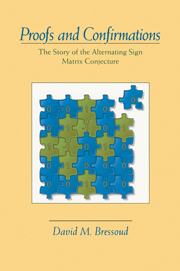5 - Hypergeometric Series
Published online by Cambridge University Press: 05 June 2012
Summary
At a lecture on hypergeometric functions I attended at the University of Edinburgh, the speaker, after foisting on us a colossal equation, announced grandly, “This result has applications in particle physics.” He then added, roguishly, “Of course, every result has applications in particle physics – the field is in such disarray.” I seemed to be the only one in the audience who was amused.
– Jet Wimp (1997)Macdonald had used results from the theory of representations of the symmetric group to prove MacMahon's conjecture. At the same time, George Andrews found a proof that drew on an entirely different tradition, the special functions of analysis that can be expressed as hypergeometric series. Connections between analysis and combinatorics go back at least to Euler, but the collaborations of Richard Askey and George Andrews, beginning in the 1970s, revealed powerful new links between partition theory and special functions.
Hypergeometric series play a small role in the Mills, Robbins, and Rumsey proof of the Macdonald conjecture. Their proof is really a tour de force of the techniques of linear algebra. But as algebraic combinatorics developed in the 1980s, the machinery of hypergeometric series became indispensable to its study. The proof of the refined alternating sign matrix conjecture will rely on some sophisticated pieces of this machinery.
Mills, Robbins, and Rumsey's bright idea
The beauty of the proof of Macdonald's conjecture for the number of cyclically symmetric plane partitions lies in its structure and its use of inspired guesswork and serendipitous happenstance.
- Type
- Chapter
- Information
- Proofs and ConfirmationsThe Story of the Alternating-Sign Matrix Conjecture, pp. 151 - 190Publisher: Cambridge University PressPrint publication year: 1999

